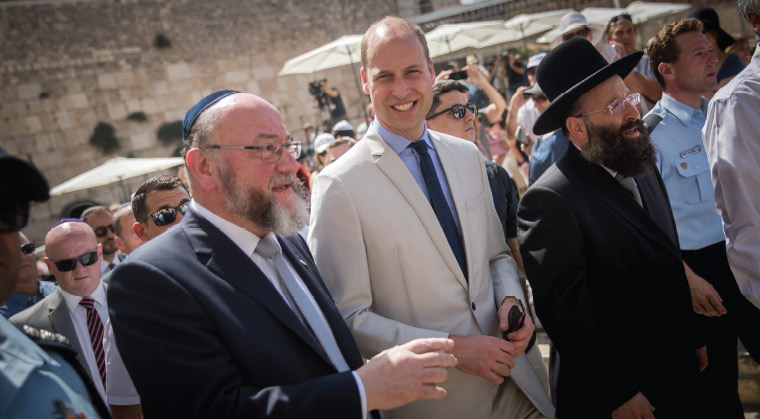British Chief Rabbi Ephraim Mirvis


S
even decades after British forces left what was then called Palestine, Prince William’s visit last week ended a de facto boycott of Israel by the British royal family.
But just as unusual as the trip itself was the fact that Britain’s Chief Rabbi Ephraim Mirvis accompanied the prince as part of the delegation. With British diplomats brunching on the terrace outside, I sat down with Chief Rabbi Mirvis at the King David Hotel, where the British Empire of old lives on, to hear the inside story of this historic visit.
I don’t remember the last time a royal was accompanied by an imam to Saudi Arabia, and yet here you are as chief rabbi accompanying Prince William to Israel. What is the meaning of this unusual joint journey?
That’s a good question, because the fact that I’m a part of the official delegation of Prince William, the Duke of Cambridge, is a statement. It speaks volumes about the very strong connection between the Jewish community and the royal family and the recognition of our connection with the State of Israel.
Kensington Palace [official residence of Prince William] invited me to be part of the duke’s delegation, and they were very sensitive to our requirements. They bent over backwards with the tiniest details to ensure that everything they were doing would be appropriate.
Can you give an example of that sensitivity?
I think they are aware that this is a country in which there is a strong religious tone. I’ll give you an example. When we went to the Yad Vashem memorial hall for the laying of the wreath ceremony, a key aide to Prince William said to me, “I’m very thirsty, can I drink some water here?”
I said, “Thank you so much for asking. In the cemetery, the answer would be no. But over here, it is in order.”
He said, “Thank you very much. I just wanted to do the right thing.”
So that’s an example of how they are so tuned in to respecting sensitivities.
I understand you gave him a kippah with a Hebrew inscription on it. Why did you choose this gift?
Prince Charles has his own personal kippah that he wore to my induction ceremony, with a royal insignia on it. He wears it with pride at Jewish events. Prince William needed a kippah for this visit, and so that’s something that our office liaised with him about. He was very particular about his kippah, you know, it should look right, et cetera. Eventually, once he had indicated the type he wanted, it was a personal gift from me to him. Inscribed on it is a pasuk that we chose from Yeshayahu [2:3]: “Come, let us go up to the Lord’s mount, to the house of the G-d of Jacob... for out of Zion shall the Torah come forth, and the word of the L-rd from Jerusalem.” Which is the purpose of this visit, with the aspiration of peace. Please G-d one day he will wear it as king of England.
Prince William is third in line to the throne, and by extension, to head the Church of England. So for him there must be a strong religious dimension. Did he say anything to you about visiting the Holy Land?
Yes. The sanctity of the land is an integral part of his consciousness, and he is very mindful of that. I think my presence with him underscored that point.
Also, the burial site of his great-grandmother, Princess Alice, is in Jerusalem. You know, I was with him in his suite this morning, and he pointed to the view of Jerusalem out of the window and said, “Isn’t this the most glorious sight?”
(Originally featured in Mishpacha, Issue 717)
Oops! We could not locate your form.













